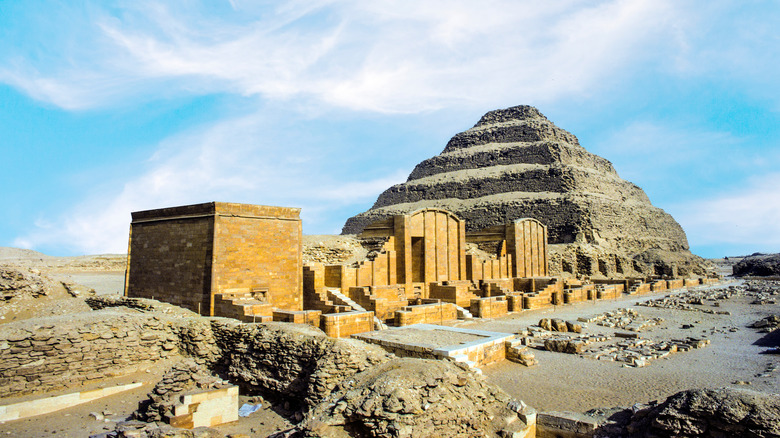The 2,600-Year-Old Cheese Found In An Egyptian Necropolis
Ancient Egypt was an astonishing civilization with powerful influence that spanned nearly 3,000 years, according to History. When envisioning this time period, many people think of the Great Pyramid of Giza, which is part of the Seven Wonders of the Ancient World, a grand funerary site for the pharaoh Khufu (via Britannica). Mummies, which have been found in Egyptian pyramids, are also symbols of the ancient civilization.
Many aspects of Ancient Egypt are studied today to gain a better understanding of how their society functioned and culture formed, including what food they ate. According to The Collector, food was an integral part of their society as they commonly used it as offerings to their gods. Their tombs were also known to have imagery of food and was sometimes filled with real food. When the tomb of Tutankhamun was discovered, foods like garlic, chickpeas, lentils, watermelon, and coriander seeds were unearthed. Many other foods have also been discovered through the years in these ancient tombs.
Recently, a group of vessels were discovered in the Saqqara necropolis during a recent excavation, some of which included several blocks of ancient white cheese.
The cheese dates back to the 26th and 27th periods of Egypt
According to Egypt's Ministry of Tourism and Antiquities, a recent excavation of the Saqqara necropolis site yielded a big discovery. The organization's Facebook page announced that a collection of vessels were discovered, some of which contained several blocks of white cheese that dates back to about the 26th and 27th periods of Egypt. The 26th dynasty commenced in Egypt in the year 664 B.C., which makes this cheese possibly 2,600 years old (via The Met). According to the Facebook post, Ancient Egypt called this type of cheese "Haram," which is now known as Haloum cheese.
The clay receptacles, which contain the cheese, are inscribed with Demotic script, which, according to The National News, is an "ancient Egyptian writing also found on the Rosetta Stone royal decree." The site also notes that the group uncovered several additional containers that are expected to be opened soon.

